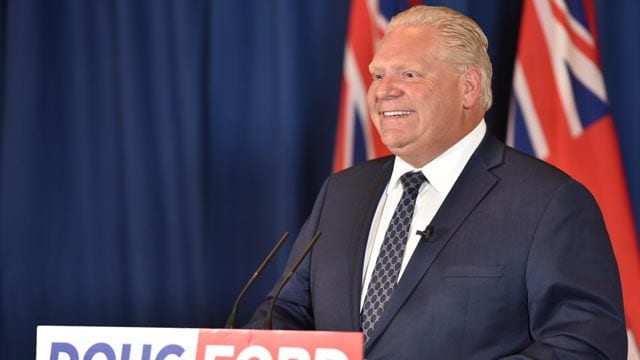
Ontario premier-designate Doug Ford during his election victory June 7, 2018. Photo: Doug Ford Twitter
On March 11, the World Health Oganization declared the COVID-19 outbreak a pandemic. APTN News is reporting from across the country on the viral outbreak and how it is impacting Indigenous communities. For more information click here: COVID-19
The Ontario government is providing few details regarding how it’s helping First Nations combat the novel coronavirus (COVID-19) pandemic but says it is holding weekly calls with leaders.
In fact, Premier Doug Ford didn’t specifically reference First Nations during a media conference Monday as he discussed steps the province is taking to combat the infectious virus.
“We’re facing some rough waters ahead,” Ford said.
Ontario is providing additional resources for public health units and hospitals, as well as asking long-term care homes to restrict and screen visitors.
“We’ve opened 17 dedicated testing centres to take pressure off our hospitals, and yesterday we released a new online self-assessment tool. You can find this at Ontario.ca/coronavirus,” he said.
“This is an excellent resource and we encourage the public to use it from home. Before visiting a COVID-19 testing centre, please – I say please – use this tool to determine if you need to seek care, and please don’t visit an assessment centre unless you’re showing symptoms.”
It’s unclear how these new measures will help First Nations, especially remote communities.
More from APTN’s Willow Fiddler.
In an email statement to APTN News, a spokesperson for Ontario’s Heath Minister Christine Elliott said the province has had weekly calls with Indigenous Services Canada (ISC) and Chiefs of Ontario (COO).
“These meetings ensured timely discussions on COVID-19 through knowledge sharing, information dissemination and future planning for First Nations communities and health workers,” wrote communications advisor Alexandra Hilkene.
The statement said that Elliott and her federal counterpart Patty Hajdu “agreed to work together to ensure proper protocols are in place” for helping First Nations.
In a parliamentary briefing on Mar. 12, ISC told federal politicians that “provision of health services to Indigenous peoples is an area of shared jurisdiction.”
The briefing was given by Valerie Gideon, senior assistant deputy minister at the First Nations Inuit Health Branch (FNIHB).
The eight-slide presentation said that, while provinces and territories provide insured health services to all residents, “geographical, systemic, and policy-related challenges can create a situation where First Nation and Inuit communities have limited access to doctors, registered nurses, medical specialists and health-related services.”
Read more:
Mixed reactions to government’s plan to address COVID-19 in Indigenous communities
The federal government is responsible for providing and supporting on-reserve healthcare services but many northern Ontario First Nations are flown to provincial hospitals for medical purposes.
Health professionals have warned higher rates of pre-existing medical conditions, substandard living conditions, disparities in healthcare infrastructure, and inequal social determinants of health place Indigenous communities at higher risk from COVID-19.
The province said they have engaged with First Nations communities on “COVID-19 community preparedness plans” and the communities will have access to “COVID-19 testing through Federal Nursing stations.”
But Donny Morris, chief of Kitchenuhmaykoosib Inninuwug First Nation (also known as Big Trout Lake), said he hasn’t been in touch with the federal or provincial government.
He said his community is implementing public safety measures and would use any support funds to ensure Elders and community members have access to traditional resources.
Ontario Regional Chief RoseAnne Archibald reported there are zero cases of COVID-19 in First Nations.
Along with preparedness measures, such as staying home as much as possible, developing a 14-day “pandemic kit”, and embracing social distancing, Archibald recommended seeking mental health supports and using the time to “get back to the land.”
There were 177 confirmed cases in Ontario as of 10:30 a.m. Monday morning. The federal government reported 324 confirmed cases and 17 probable cases as of 9:00 a.m.
There have been four deaths – all in British Columbia and all resulting from an outbreak at a long-term care facility.
Ford advised people not to “panic buy and hoard essential items.”
“There is plenty of food and household essentials to go around. Be prepared, but let’s make sure there’s enough for everyone.”
-with files from Willow Fiddler










I am wondering where I can find up-to-date information with any confirmed cases in Ontario First Nations communities or even to find out if there are still zero cases. I would also like the same information for Canadian Indigenous communities. Thanks.
Time to assist those on reserve with mental health and elderly clients with ensure and essential supports including hospitals in their own communities and communication devices to each household in communities such as isolated Takla Landing. BC